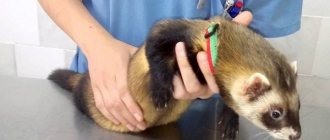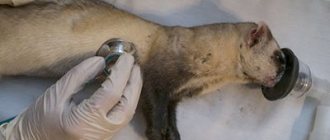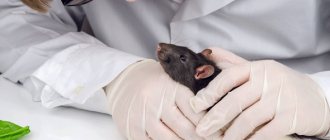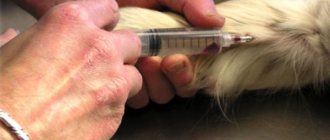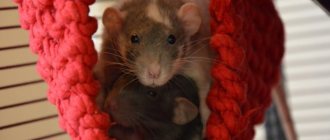Domestic ferrets require special care. At an early age they are affectionate and loving, but during puberty they can show aggression and disobedience. To calm down an unusual friend, owners are advised to castrate or sterilize their ferret. This procedure is performed by qualified specialists in a veterinary clinic.
In the article we will look at why ferrets are castrated or sterilized, the recommended age, rules of preparation and methods of carrying out the procedure, tips for care after the intervention.
Castration and sterilization: what is the difference
Many pet owners equate two completely different concepts: castration and sterilization. These are two different procedures with different consequences.
Castration translated from Latin means “emasculation”, “castration”, that is, a procedure consisting in the removal of reproductive organs through surgery.
During castration, the testes of males are removed, and the ovaries of females are removed. If complete castration is carried out, the female's uterus is also removed. During the operation, the gonads are completely removed, which means that the pets are completely deprived of reproductive function. As a result, ferrets' hormonal levels change.
Sterilization in Latin means “infertility.” During the operation, animals lose the ability to reproduce, but the genitals are preserved and no hormonal disturbances occur.
During the sterilization process, ferrets (males) have their spermatic cords ligated, and female ferrets have their uterus removed.
The two procedures have no effect on the animals' behavior.
Complications that may occur
As is the case with humans, ferrets may not be able to cope with the surgery (although this is rare). As a consequence, the occurrence of postoperative complications.
The reasons are:
- Infection or bleeding. The whole reason lies in: unsterile premises;
- poor handling of instruments for surgery;
- inexperience of the medical worker;
- failure to follow care instructions.
After chem. Sterilization may result in:
- breast disease (proliferation of mammary gland tissue);
- rapid weight gain;
- gastrointestinal diseases, etc.
In order for the results of the operation to be positive, you should carefully choose a veterinarian and follow all the advice of specialists on care and feeding.
Preparing for surgery
Regardless of which ferret surgery technique is chosen, you need to prepare for it in advance. It is important to observe the following:
- About a week before the operation, it is necessary to check his health. If you suspect any illness, you should take him to the vet.
- Stop feeding 8 hours before surgery and stop drinking 2 hours before surgery.
- Carry out wet cleaning in the apartment/room.
- Wash the cage thoroughly and remove the bedding;
- Remove food and water from the cage.
- Prepare a towel or small blanket that will be needed after the operation.
Important: Do not give your pet food or water before surgery.
If the operation is performed in a clinic, after the operation you should wrap your pet in a previously prepared towel or blanket. When transporting an animal home, you need to minimize shaking and other inconveniences.
It is worth noting that a qualified specialist can perform surgery at home.
Preliminary inspection
It is important to make sure that the animal is healthy and will tolerate surgery well. To do this, you need to be examined by a veterinarian a week before surgery.
- To avoid the risks of surgery, you need to carefully choose a clinic. The doctor must have experience treating ferrets - only a professional can correctly calculate the dosage of anesthesia.
- Before surgery, the veterinarian should carefully examine the pet. The doctor is also interested in the ferret’s nutrition, when signs of estrus appeared, and whether there are any specific complaints.
- Blood composition is analyzed. And if the doctor has doubts about the female’s health, they may additionally prescribe a blood biochemistry test. If blood cannot be taken, feces and urine are examined.
Before the operation, it is necessary to undergo an examination by a veterinarian and take blood tests.
The owner must remember that ferret sterilization is only possible for healthy and vaccinated animals. If the heat comes suddenly, and the female has not yet had time to receive all the vaccinations, she will be urgently administered the necessary medications. Further vaccination is discussed with the doctor.
Should you neuter your ferret at home?
Veterinarians believe that the castration procedure will be most successful if the ferret is castrated at home. Despite the fact that the service of a doctor visiting your home will cost slightly more than a regular operation in a clinic, castration at home has beneficial advantages:
- You will reduce the stress your pet may experience from the procedure.
- The ferret will be in its usual habitat
- Recovery after surgery will be smoother and painless
If you choose home castration, you need to make sure that the operation will be performed by an experienced specialist who already has experience in similar operations. In addition, the procedure itself must be supported by modern equipment and high-quality anesthetics.
Rehabilitation
After your ferret is castrated, you must strictly adhere to all the recommendations given by the veterinarian. It is prohibited to change or prescribe any medications on your own. Any actions can be carried out only with the permission of the treating specialist.
Most often, sutures are treated with Chlorhexidine and Miramistin. Medicines destroy bacteria on the incision, preventing inflammatory processes. Zelenka and iodine can cause burns, and folk remedies after surgery are very dangerous.
In the first week, you need to carefully observe your pet’s behavior. An increase or decrease in temperature, a change in the color of the mucous membranes are the first signals that something is wrong in the body. It is better to contact the surgeon by phone or immediately take the animal to the clinic.
It is necessary to limit the ferrets’ excessive mobility after surgery and keep them in a cage for the first time.
What to do if your ferret is licking your stitches? If a nimble pet tries to reach the wound through a bandage, it is better to put a special collar on it. You can purchase it at a veterinary pharmacy or make it yourself from a plastic half-liter bottle.
Before the stitches are removed, hygiene procedures and walking outside are prohibited. Until the fur grows back, drafts must be avoided, and any temperature fluctuations must not be allowed: overheating or cooling. After surgery, the permeability of the stomach may worsen, so a one-time intake of 2 g of petroleum jelly will help protect against constipation.
Castration of a male ferret
In the 7th month of life, males begin the rut, which can last from 6 months to a year. At the same time, the ferret will not calm down after one mating, because he will need at least 4 matings with different females. Due to the increase in hormonal levels, problems with the adrenal glands may occur.
To avoid this, it is necessary to perform an operation to remove the testes. However, there is no need to rush into castration too much. The rut marks the final maturation of the animal’s body. Therefore, veterinarians advise castrating before the start of the first rut, but not before the final formation of the testes.
It is easy to notice the beginning of the rut - the pet’s behavior becomes aggressive and anxious, the testicles increase in size, and the skin begins to smell unpleasant. Foul-smelling marks appear in the apartment.
The procedure itself is done in a veterinary clinic, although an experienced doctor can do it at home. The testes are removed from the testicles through small incisions, which will heal quickly and leave no noticeable scars. You can choose general or local anesthesia; castration of the male is a very easy and quick procedure. At the same time, when the ferret is castrated, the anal glands can be removed at the same time.
At the request of the owner, you can only sterilize the ferret, limiting yourself to ligating the spermatic cords. This method will preserve the possibility of mating for the pet, but will make it infertile. However, the unpleasant odor will not go away, so ferrets are spayed infrequently.
The ferret recovers from anesthesia without complications. The sutures are removed already on the 10th day. Care after surgery is the same as for females.
After recovery, the males' character changes. The animal becomes affectionate and friendly, the aggressiveness goes away, and the ferrets stop biting. The marks also disappear. Contrary to popular belief, castration of a ferret does not cause excess weight gain and does not deprive the pet of playfulness and activity.
Surgery
The procedure takes place under general anesthesia for 30 minutes: the girl’s abdominal cavity is cut with a scalpel in a certain place that bleeds little. The uterus is removed from the abdomen, the ovaries are removed, and then stitches are placed.
Neutering a ferret is less troublesome. Anesthesia is needed in order to immobilize the nimble animal, and the operation itself takes at least 15 minutes. The boy's scrotum is carefully cut, the testes are removed and stitches are applied.
For animals of both sexes, experts recommend additional removal of the paraanal glands, which are a source of unpleasant odor. This secret is used to mark the territory, so it is better to worry about your comfort in advance.
If a person does not want to permanently deprive a pet of reproductive abilities, they practice tying the sex cords. The body continues to produce hormones, but the animals cannot conceive babies. This procedure is rarely used for small pets.
Female ferret in heat
Once started, a ferret's heat will not end without mating. Due to a hormonal imbalance, the animal will begin to lose weight, get sick often, the fur will begin to peel off, and the skin will develop a persistent smell of urine.
Therefore, it is necessary to carefully monitor the onset of puberty in the female. This usually happens at 7-8 months of life, when the first estrus begins. It is important to carry out the operation before it begins, at the age of 5-6 months. The longer you delay spaying a female ferret, the worse it will be for her. The maximum limit is 1-2 donations after maturity.
You can notice the onset of estrus in a ferret by a swollen and enlarged loop and a change in behavior.
How to remove a female from a prolonged heat
A long state of estrus - a month after the start of the rut - leads the pet to exhaustion, baldness, frequent illnesses and even internal hemorrhages. The ferret becomes lethargic and apathetic.
For treatment, you need to carefully study the blood test. And if it is no longer possible to remove the animal’s gonads, temporary measures can be taken:
- Mating with a sterilized male. This will cause ovulation and false pregnancy.
- Injection of the drug "Khorulon". It also leads to a state of false pregnancy. However, it is not recommended to use the product more than once. After such emergency care, it is necessary to sterilize the female with complete removal of the ovaries and uterus.
Sterilization of a female (fert)
There are 3 types of sterilization operations:
- Tubal ligation.
- Ovariectomy - removal of the ovaries.
- Ovariohysterotomy - removal of the ovaries and uterus.
Complete removal of the uterus and gonads is the preferred solution, since it saves the pet from possible complications and from estrus forever. Ferrets tolerate this operation easily. It lasts no more than 20-30 minutes, during which the animal is under general anesthesia.
The incision to remove the gonads is small, about 1.5 cm. The sutures are removed already on the 6-7th day. You can also use special absorbable threads for stitches that do not require removal.
After the procedure, the smell from the ferret's skin will almost completely disappear. In addition, if the paraanal glands are also removed during the operation, the problem of the unpleasant specific smell that ferrets use to mark their territory and scare off enemies can also be solved.
The animal will recover from anesthesia in ~3 hours and will not feel pain or severe discomfort. The technique of the operation is so simple that, if desired, it can be performed even at home. Of course, you need to call a highly qualified doctor for this, and the cost will be higher than in a clinic. But the pet will not experience severe tension and stress.
Chemical sterilization of a female
Some owners do not want to deprive their pets of the joy of motherhood. Then they resort to temporary methods of stopping estrus. However, sometimes the animal may develop an allergy to the chemical components of the drugs.
- Hormonal injections. They cause a state of imaginary (false) pregnancy due to forced ovulation. Estrus passes on the 8th day, but resumes after 4 - 8 weeks, and a new injection is required. This is fraught with complications of the adrenal glands or the appearance of malignant tumors.
- Prolygestone (steroid) injections. They begin to be pricked before the start of the rut. They have many side effects and contraindications and can only be used for completely healthy animals. However, they are good because they are suitable for ferrets of both sexes. They also provoke a state of imaginary (false) pregnancy in females.
- "Suprelorin" is an implant with the substance deslorelin. It is inserted under the skin with a needle. The rut stops after a month, the drug lasts for ~2 years. It does not cause discomfort to the animal and is recognized as the most effective means of chemical sterilization. It costs expensive.
Only a doctor can prescribe and use these drugs. And, of course, these methods will not solve the problem of smell and marks.
Optimal age for surgery
Owners of a male ferret need to know at what age to castrate their pet. After all, if you do this at the wrong time, the animal will begin to have health problems.
The optimal time for the operation is before the start of the first rut. But castration cannot be carried out when the animal has not formed testes in the testicles. Otherwise, this will provoke a delay in the physical and mental development of the animal.
The formation of testes in males occurs at the age of 6-8 months.
Before the start of the first mating season, the pet's behavior changes, its fur will acquire an unpleasant odor, the testes will descend and the testicles will become clearly visible (before that they will be practically invisible).
When the owners do not intend to allow their pet to mate, it is recommended to undergo surgery during this period.
If this is not done, the ferret will become aggressive, start looking for a female, and not finding her, will try to “mate” with the owner’s toys and feet. Due to changes in hormonal levels, the sebaceous glands begin to function incorrectly, the fur becomes greasy, and areas of alopecia appear. The animal's tail and belly are balding.
Living together with a ferret will not be very comfortable, because he will begin to mark his territory and stop going to the litter box. If the pet shits in the wrong place and it was not possible to catch it at the crime scene, then scolding it later is useless; moreover, the animal will be offended and go to the toilet in another revenge.
Read more: How to store quince at home
Castration of an animal can be carried out after the end of the rut and even during it. The animal is operated on during the mating season only if it begins to go bald and feels unwell.
But owners must remember that a ferret that has survived one rut remains aggressive even after the pet is castrated.
Why spay female ferrets?
Estrus for female ferrets is even more dangerous than rutting for males. In the absence of mating, the animal cannot exit this state on its own, which provokes irreversible physiological disorders, including death. If left untreated, prolonged estrus is characterized by pet lethargy, thinness, and baldness.
The only option is castration. The term “sterilization” for female ferrets is not entirely appropriate, since this is a tubal ligation procedure, and ferrets have their ovaries removed in order to avoid repeat heat. In some cases, the uterus is also removed.
The ideal age for surgery is 6-8 months. In order to maintain the health of ferrets not intended for breeding, it is necessary to neuter both males and females on time.
Age restrictions
To reduce the risk of complications, the castration process should be carried out in a timely manner. Veterinarians warn novice ferret lovers against carrying out this procedure too early, before the animals have completed the formation of the genitourinary system and while the animals are growing. Both of these processes are completed by the end of puberty. Therefore, it is necessary to sterilize animals no earlier than they reach sexual maturity.
The first signs of puberty in female ferrets begin to appear at about six months of age. Therefore, the most optimal time for their castration is considered to be 6-8 months of age. At the same time, some veterinarians advise carrying out the procedure even before the start of estrus, while others recommend doing it after it has started.
Important! The physiology of each ferret is individual, so the time of castration for each individual must be selected individually.
The onset of maturity in a female can be determined by her behavior. An animal ready for mating begins to show anxiety that seems unreasonable at first glance, and the ferret’s appetite worsens. Also, females, like males, can leave urinary marks.
Among the external signs, it is worth paying attention to the enlargement of the outer part of the urogenital opening (loop).
If you have doubts about the correctness of your observations and whether the animal has reached sexual maturity, it is recommended to contact a specialist who will determine the time of castration.
How to care for an animal after castration
After surgery, the ferret is wrapped in a blanket or blanket to provide him with a comfortable environment and help him adapt faster.
Ferrets recover from anesthesia very quickly, but for several hours they cannot control their actions: pets can rise to their paws and immediately fall to the side, shaking their heads. Within a day, the ferret's condition returns to normal.
After the operation, it is recommended to give your pet water, but it is better to wait with feeding until he has fully recovered from the anesthesia. At first, it is recommended to keep the animal in a cage, thereby limiting its mobility.
Sutures are treated with chlorhexidine or another agent prescribed by a veterinarian.
You should not expect a drastic change in behavior from your ferret. The animals become calmer a couple of months after the operation, and over time their temperament gradually evens out.
Feeding your ferret after sterilization
After sterilization, the metabolism changes somewhat, and some processes in the animal’s body slow down.
To maintain a normal balance of proteins, fats and carbohydrates, special food is needed not only for sterilized ferrets, but for all ferrets. Ready-made professional food should be purchased only from premium and super premium manufacturers with an impeccable reputation.
Purchasing economy class food threatens to deteriorate your pet's health, because... Manufacturers of economy-class food introduce food waste, chemicals, dyes, etc. into their composition. Such nutrition will not only not help maintain the health of the pet, but will also cause irreparable damage to the condition of the animal’s body.
Bosh Totally Ferret ferret food is a complete, super premium ferret food. This food contains easily digestible proteins, vitamins and minerals that make your pet's coat smooth, shiny and silky. This food is even used in the diet of ferrets that are preparing to participate in an exhibition.
Postoperative period
After surgery, your ferret needs special care. The owner needs to monitor his condition and limit movement around the house for 2-3 days. He will fully recover from the anesthesia the next day. In the first hours, weakness, loss of orientation, and loss of appetite are observed.
The first feeding after surgery can be done 3-4 hours later. It is recommended to use soft food or dry food soaked in water. Food should be served in small portions.
After surgery, a wound with surgical stitches will remain on the ferret’s body. They need to be treated with antiseptic solutions - peroxide or chlorhexidine. Detailed prescriptions are issued by the attending veterinarian.
Care instructions:
- During the postoperative period, it is forbidden to take the ferret outside for some time. Such walks have a high risk of infection of the animal.
- It is best to leave your pet in a clean cage for the entire rehabilitation period, which will last up to 10 days.
- It is necessary to maintain hygiene in your ferret's cage. Remove any wood filler from the tray and leave a clean grid.
- The ferret does not need to be bathed for 2-3 weeks after surgery.
- For the first two days, the owner needs to monitor the frequency of the animal’s stool. If your pet does not defecate, contact your veterinarian. The doctor will select a drug to eliminate the problem with stool.
10 days after the operation, the sutures are removed.
Life of a ferret after castration
Castration will have a positive effect not only on the ferret’s health, but also on its overall quality of life. The male will again become playful, affectionate, obedient, cheerful, aggression will disappear, the smell of the skin and hormonal levels will normalize, and sexual desire will no longer bother him.
Castration will not affect your ferret's activity or weight in any way. He will continue to be active throughout his life and will remain at his normal weight. Neutered ferrets will not be lazy and put on weight like cats.
In addition, the risk of cancer and adrenal gland diseases in the animal will decrease, and according to statistics, life expectancy will also increase.
Operation at home
This procedure can be carried out not only in a specialized clinic, but also at home, it is not complicated, the most important thing here is the experience and qualifications of the veterinarian. But the owner and pet will not experience unnecessary stress and tension. In a familiar home environment, the operation will be more comfortable for both of them.
During sterilization, it is recommended to remove the paraanal glands - these are miniature sacs with yellow liquid secretion, located on both sides of the anus, they emit an unpleasant odor, in this case the ferret will not have to be subjected to general anesthesia twice. Their removal is a prevention of the development of possible inflammation and abscess that occurs when the glands are overfilled. Their presence is relevant in the animal’s natural habitat, in the wild, where they are used to scare away enemies and mark their territory; in the home environment they lose their functions.
The pet owner should not worry; the female animal tolerates the procedure easily.
After the operation, the ferret becomes more joyful, healthy, his excess aggressiveness and the desire to mark his territory disappear. And if the pet is happy, then the owner is happy.
Relationship between surgical castration and the development of hyperadrenocorticism in ferrets
In an unspayed ferret, luteinizing hormone (LH) from the pituitary gland acts on the testes and ovaries, stimulating the gonads to secrete sex hormones.
After castration, LH continues to be produced in the pituitary gland, but since the gonads are absent, the target tissue becomes the adrenal glands, which contain receptors for LH (after removal of the gonads, the feedback mechanism for suppressing the production of gonadotropin-releasing hormone, which is used to suppress the production of gonadotropin-releasing hormone in a healthy ferret, disappears). production of LH and FSH).
Under the influence of prolonged stimulation, adrenal hyperplasia and neoplasms - adenomas and adenocarcinomas (hyperadrenocorticism) occur. A correlation has been described between the age of castration and the time of manifestation of symptoms of hyperadrenocorticism (the earlier one was castrated, the earlier the disease manifests itself).
The incidence of hyperadrenocorticism in the population of castrated ferrets, according to various authors, is estimated at 20-80%, which is very high.
The main clinical signs of hyperadrenocorticism in ferrets are: spontaneous alopecia (hair loss), itching, enlargement of the skin of the vulva in females, urinary disorders in males (development of prostate cysts). Provided castration is over 7 months of age, the average age of development of hyperadrenocorticism is 3-4 years.
Unfortunately, chemical castration cannot 100% guarantee the absence of the development of hyperadrenocorticism (since this disease has also been described in non-castrated animals), but the likelihood of the disease occurring is several times lower. Photos 5 and 6. Typical appearance of a ferret with hyperadrenocorticism.
Chemical sterilization
Currently, two methods are used to eliminate sexual activity in female domestic ferrets. One of them is medical or chemical castration.
During chemical castration, special hormonal drugs are injected into the ferret's body by injection. At the same time, all medications used must include gonadotropin. The medications mimic a surge of luteinizing hormone, causing estrus to stop.
There is an opinion among owners of domestic ferrets that chemical castration is a more gentle and humane method. However, veterinarians strongly disagree with this point of view. The disadvantages of chemical castration include:
- high probability of developing a false pregnancy;
- repetition of estrus after a certain time (usually twice a year, but maybe more often);
- the likelihood of your ferret developing an allergic reaction to medications;
- possible disturbances in the functioning of the animal’s adrenal glands, the formation of malignant tumors.
Therefore, it is recommended to use the method of chemical castration when the owner only wants to temporarily suppress the animal’s sexual activity, but does not plan to completely deprive the ferret of the joy of motherhood.
Points for and against
Opponents of castration of ferrets are owners who do not have experience in breeding and keeping these animals. The main arguments that are usually put forward against the operation are: inhumane treatment of the animal and deprivation of its ability to reproduce.
As a result, an animal that does not have the opportunity to mate is in constant psychological stress, and a prolonged rut, which causes the production of an increased amount of sex hormones, causes the ferret to become bald and develop many dangerous pathologies.
Often, owners seek medical help too late, and sterilization performed on an adult pet does not help restore the ferret’s lost health.
Veterinarians and experienced breeders advocate the need for castration of ferrets. Removing the gonads, in their opinion, is much more humane than exposing the animal to constant stress and the risk of developing aplastic anemia and other diseases.
pros
The positive aspects of castration of ferrets include the following:
- Males stop leaving unpleasant-smelling marks, and the pungent odor from the pet itself disappears.
- Ferrets stop searching for a sexual partner, become calmer and more obedient, and are easier to train.
- After the intervention, fights and rivalry between individuals of the same sex stop.
- Life expectancy increases, the likelihood of developing certain dangerous pathologies decreases.
Minuses
The disadvantages include possible complications after surgery and side effects of hormonal drugs that are used for chemical sterilization of ferrets.
How to stop a heat
If you give the ferret the opportunity to have offspring, but cover her with a sterilized male, or do not comply with the mating dates, then the animal’s suffering will end. But in this case there is a risk of developing a false pregnancy.
Hormonal medications can be used once a season. But they are not safe for the animal’s health and can only support its body for a short time.
The most reasonable way out of the situation, if breeding ferrets is not part of the breeder’s plans, is to sterilize the female ferret.
conclusions
- Chemical castration is the method of choice for suppressing sexual behavior in ferrets; placement of Suprelorin implants is a safe alternative to surgical castration
- Surgical castration is the method of choice if there are medical indications for removal of the uterus, ovaries, testes (neoplasms, inflammation, trauma, etc.)
- Regular placement of Suprelorin implants is recommended for all previously neutered ferrets to prevent hyperadrenocorticism.
Exit from a protracted heat
If mating does not take place, the female is not able to come out of estrus on her own - this is called prolonged estrus. This happens in almost half of the females.
The phenomenon of prolonged estrus could not be fully learned. Fraught with consequences:
- Hair loss.
- Exhaustion.
- Hemorrhages into internal organs.
- Infections.
- State of prostration.
Such complications occur only in domestic animals. In nature, females' estrus ends on its own. It does not entail complications or catastrophic consequences (regardless of whether there was mating or not).
An estrus that lasts more than 30 days is considered protracted. The owner can bring the animal to this state. Sometimes, people just feel sorry for the ferret, and they buy it with an existing problem.
In this case, a blood test is taken from the female; if the deviation is no more than 10%, surgery can be performed. If the deviations are significant, the following measures are taken:
- The female must be covered (up to 15 days or 30-40 days after the start of estrus). Ovulation will occur and a false pregnancy will occur. This condition is dangerous. Fertilization may also occur.
- The female is mated with a spayed male (not neutered). When a ferret is neutered, it is able to mate but cannot fertilize. Such coverage will lead to a false pregnancy; the female will take care of someone in the family and provide him with constant care.
- You can use the drug "Khorulon". It will trigger ovulation followed by their coming into heat. Veterinarians recommend using this drug once, then sterilization is necessary. Constant use is fraught with a number of diseases. After using the drug "Holuron", it is necessary to remove the ovaries along with the uterus. The recovery period is almost a month. It is advisable to take additional blood for testing.
Ferrets: female sterilization, price for the service in Moscow
Let's determine why sterilization of a female ferret is necessary. With the desire to have a pet comes the awareness of great responsibility , because in this matter some discipline and control is necessary.
All animals are wonderful, but probably the most fun and interesting representative here is the ferret. Moreover, ferrets are quite beautiful, undoubtedly intelligent, and even somewhat daring in their disposition, especially when they are in heat.
Without a doubt, males have taken it into the habit of marking their own territory, in this they are similar to cats, because they also mark it, showing others who is the true master here.
But an animal can emit a sharp, unpleasant odor even when it is frightened, or it finds itself in an unfamiliar situation and receives great, deep-seated stress from this. As for females, due to the inability to mate, they are susceptible to diseases, which is why it is so important that your female ferret be spayed.
- chipping (implantation under the skin)
- teeth cleaning (tartar removal)
- surgery (operations at home and in the clinic)
- Ultrasound (ultrasound examination)
- euthanasia and cremation of animals
- castration (sterilization of animals)
- haircut (haircut at home)
- childbirth (delivery)
- vaccinations (vaccination)
- piroplasmosis (treatment and prevention)
- traumatologists (osteosynthesis)
- tests (laboratory diagnostics)
- therapy
- x-ray
- ophthalmology
- dermatology
- neurology
- cardiology
Why is it necessary to sterilize a female ferret?
Sterilization of a female ferret is required in order to change the animal's behavior for the better, and in most cases, even prolong their life! The moment the female releases hormones, which happens when she is in heat, they begin to have a devastating effect on the animal's health, but more importantly, on the ferret's overall behavior.
The animal changes just before our eyes, thereby becoming quite aggressive, disobedient and extremely restless, stops going to its litter box, and begins to mark the entire territory of the house with its unpleasant secretions.
As for female domestic ferrets, their estrus can take months, which can lead to their early death.
For all the reasons listed above, it is absolutely necessary to sterilize your animal.
Of course, this is a serious matter, for everything to be successful, you need to entrust your animal into the hands of a qualified specialist; if you don’t have one nearby, then we suggest contacting us. By contacting our Ya-Vet veterinary center, you will be able to use the services of our excellent and experienced veterinary doctors, who have already performed more than one castration procedure during their practice.
- Always have your diplomas and all documents with you
- Free consultation with a veterinarian before departure
- More than 20 highly specialized specialists
- We disinfect the premises before operating rooms
- We create a medical history for each animal
- Complex operations are performed in a hospital
How much does it cost to spay a ferret?
Moreover, in our veterinary center it is possible to castrate your female ferret quite inexpensively, at a very affordable cost. Thus, you can protect your animal from premature death in time.
If you don’t have enough time, our veterinary center offers a service of calling a veterinarian to your home.
And, believe me, this option is also extremely profitable, both in terms of its cost and the quality of the services provided.
To find out the cost of ferret sterilization, call the phone number provided on the website. Telephone consultation with our specialists is free.
Sterilization of a female ferret: how to prepare the animal for the procedure
So, the decision to carry out the operation has been made, the most difficult thing remains, the preparatory stage for it , and it includes the following points:
1About ten days before the agreed date of the operation, you need to deworm your ferret . This needs to be done, even if it seems to you that there are no solid reasons for this; during the procedure, you can use a drug such as “Prasicide-suspension” for cats. And just do everything according to the instructions, which can easily be found at the bottom of the box.2 Immediately before going to the veterinarian, measure your ferret’s body temperature using a special digital rectal thermometer for this purpose. Body temperature should be 38-39 degrees, but if the thermometer shows that the temperature is above the mark, then postpone the trip. Only a healthy animal can undergo surgery. Remember this. 3Also, the animal must be kept on a twelve-hour fast. Of course, you can give the ferret water, but you can’t feed it! But there is a nuance with drinking: remove the water one hour before the operation.
- ophthalmologist Anna Aleksandrovna Mikheeva
- cardiologist Moskalu Andrey Petrovich
- Ultrasound diagnostics doctor Tamara Viktorovna Prokhorenko
- trauma surgeon Vadim Valerievich Skripachev
Rehabilitation after surgery to sterilize a female ferret
When the worst is already behind us, an equally important period begins, namely the rehabilitation of the ferret.
The very first thing you will need to do after the operation to sterilize a female ferret is to place it on a hard carrier with a woolen bedding, and on top you can also wrap the animal with a warm cloth so that the animal can quickly warm up. Leave only the ferret's head exposed.
Now that your ferret is already sterilized, you may not be worried about estrus and everything that was previously associated with it.
The first few hours after the animal has been operated on , your female will be inactive, during this time you can try to give her some water, but not food, it is better to wait with this.
Neutered ferrets should be given food gradually and little by little, but with each new meal the amount of food can be increased slightly.
And, gradually, hour by hour, your ferret or your ferrets will move away from the surgical intervention. It is important here to make sure that the ferret does not try to remove the mesh and cotton wool that cover the incision site along with the sutures.
This needs to be done exactly the first time, the first days after the sterilization procedure, and when the female manages to remove the mesh with cotton wool, then do not let her lick the seams.
You will need to carefully examine the wound so that there is no discharge from there, especially pus, this is the most important point!
If you notice that there is purulent discharge, immediately call your veterinarian, or lubricate the wound yourself with a five percent iodine solution. After two weeks, the stitches will need to be removed, at which point your ferret's rehabilitation ends.
How can sterilization affect the future life of a ferret?
Spaying a female ferret will certainly have an impact on her future life. However, it will in no way have a negative impact on the existence of the animal.
Vice versa! When the estrus stops, the ferret will become affectionate, not aggressive, and most importantly, carefree, because now the female will not be bothered by her instinct for self-reproduction.
If you want to have your animal sterilized, then contact us at the veterinary center, we are located in Moscow, and our price for the procedure will pleasantly surprise you.
and raising a ferret in an apartment, what to feed a ferret, where to buy a ferret
Ferret domestic ferret
Ferret exhibition 11/20/2011 Nizhny Novgorod
- Balashikha
- railway
- Krasnogorsk
- Khimki
- Dolgoprudny
- Mytishchi
- Kommunarka
- Arkhangelskoe
- Odintsovo
- Nemchinovka
- Vlasikha
- Moscow
- Shcherbina
- Vidnoe
- Podolsk
- Domodedovo
- Dzerzhinsky
- Lyubertsy
- Korolev
- Kotelniki
- Reutov
- Lytkarino
- Barvikha village
- Dedovsk
- Zelenograd
- Lobnya
my phone number
And our specialist will contact you
, please select a piece of text and press Ctrl+Enter.
Source: https://ya-vet.com/vet-uslugi/horki-sterilizatsiya-samki-tsena-v-moskve
